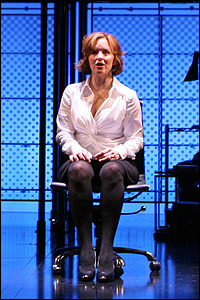
*
Alice Ripley came to prominence in her third Broadway show, playing the cute, uncomplicated, vanilla-sweet Betty Schaefer of Sunset Boulevard, the girl-next-door Joe Gillis shoulda gone for instead of the demented (and deadly) Norma Desmond.
"I kept waiting for Betty to have her coming-of-age song. It was never written. She needed to have her own moment of discovery, but that show really wasn't about Betty. It was about" — Ripley shifts into grandiose Desmond overdrive — "NORMA!"
The downside of normal came the day of the Tony nominations: She was the only one of the four leads left uncited. George Hearn, up for his butlering and caregiving, gently consoled her: "He took me by the shoulders and said, 'It wasn't your work that didn't get nominated. It was your role. There are roles that are going to beg for this kind of attention, and there are roles that won't, necessarily. You have a choice.'"
Since then, Ripley's choice has been to find rough roles to hoe. In the short-lived Side Show of 1997, she and Emily Skinner shared Tony bids (and stage space) as Violet and Daisy Hilton, the conjoined vaudeville twins. "People have stopped calling me Emily just recently, after many years," she notes with a smile of visible relief. "We still joke about it in our act together. We have a little concert that we do together." Now, in Next to Normal, she is the epicenter of dysfunction in the family of four that's taken up residence at the Booth. At first glance, from a picture-perfect, white-picket-fence perspective, Diana (Ripley) and Dan (J. Robert Spencer, a Side Show swing-turned-original Jersey Boy) seem ideal suburbanites — a delusion seconded by their offspring: son Gabe (Aaron Tveit) and daughter Natalie (Jennifer Damiano) — but dark, disfiguring clouds of sadness hover. Since the show starts evolving from the eschewed view of the unhinged hausfrau-in-residence — like the opening of Dr. Caligari's cabinet — the real world in which the story rests is slow to show itself.
Written by Tom Kitt (music) and Brian Yorkey (book and lyrics) and directed by Rent's Michael Greif, Next to Normal sifts through the debris of a home wrecked from within by a bipolar mom. It's a great shot for Ripley — and she knows it.
 |
||
| Alice Ripley in Next to Normal |
||
| photo by Joan Marcus |
Ripley, in interviews, treads this tightrope sure-footedly to intrigue but not reveal. "The central theme here is unrecognized loss, as opposed to grief. Closure is the word used for a loss that's not acknowledged — and the habit this causes, physically and mentally, for anybody who is participating in that. Suppressed grief is a serious concern for our community right now. Just look at the economy. I'm sure there are people right now sitting at their computers crying over what they are losing."
Ripley continues, "Any kind of grieving that is not allowed causes a break. In our culture, grieving in public is not encouraged, but in other cultures it is done publicly. Some cultures have walls where people can cry. We don't have that. We have theatre where there's always the chance for you to face things within yourself. Hopefully, this show will transform the audience. I feel transformed by it when I'm on stage. I find parts of myself revealed through Diana."
Normal is not possible here, but next to normal is a goal. "There's an eco-system that's growing over the show — a certain momentum that's moving along with Next to Normal," Ripley contends. "Stephen Spinella made that idea pop into my head. We talked about it when we did The Dead together — how The Dead had an eco-system that grows as the show progresses. It never shows, but it's real. Stephen would say, 'The show doesn't really exist in the script. It exists in what we do.' I think he was right. With Next to Normal, I can feel that eco-system over the show gathering more interesting nooks and crannies and relationships getting webbed in unimaginable ways. It has to do with the audience, too, not just the people doing the show.
"The lyrics at the end of the show, when we try to make sense of it — we say things like, 'The price of love is loss, but still we pay. We love, anyway.' Diana still thinks, 'Maybe I won't love. It's easier not to' — but only in the short term. In the long term, it's better to love. The payoff comes later, after you've invested in the idea of love."











